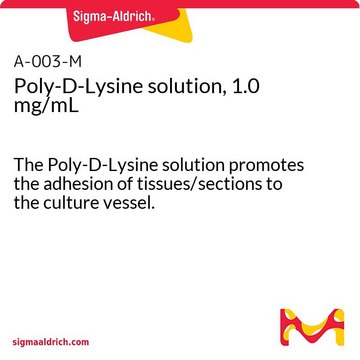P4832
Poly-ʟ-Lysine Hydrobromide
synthetic, mol wt 150,000-300,000, solution, 0.01%, suitable for cell culture
Synonym(s):
PLL Solution
About This Item
Recommended Products
Product Name
Poly-L-lysine solution, mol wt 150,000-300,000, 0.01%, sterile-filtered, BioReagent, suitable for cell culture
sterility
sterile-filtered
Quality Level
product line
BioReagent
form
solution
mol wt
150,000-300,000
packaging
pkg of 50 mL
concentration
0.01%
technique(s)
cell culture | mammalian: suitable
impurities
endotoxin, tested
solubility
water: soluble
shipped in
ambient
storage temp.
2-8°C
InChI
1S/C18H38N6O4/c19-10-4-1-7-13(22)16(25)23-14(8-2-5-11-20)17(26)24-15(18(27)28)9-3-6-12-21/h13-15H,1-12,19-22H2,(H,23,25)(H,24,26)(H,27,28)/t13-,14-,15-/m0/s1
InChI key
WBSCNDJQPKSPII-KKUMJFAQSA-N
Looking for similar products? Visit Product Comparison Guide
General description
Application
- In coating 96-well plates for cell attachment in testing respiratory burst activity.
- In coating glass cover slips for immunofluorescent labeling of intracellular structures.
- For pretreating 6-well plate in myosatellite cell isolation protocol.
- In coating coverslips for cell adhesion in E14 neuron culture to study possible mechanism of action of circRNA_01477 in neurons.
Biochem/physiol Actions
Components
Preparation Note
comparable product
related product
Storage Class Code
12 - Non Combustible Liquids
WGK
WGK 2
Flash Point(F)
Not applicable
Flash Point(C)
Not applicable
Choose from one of the most recent versions:
Already Own This Product?
Find documentation for the products that you have recently purchased in the Document Library.
Customers Also Viewed
Articles
Poly-Lysine enhances electrostatic interaction between negatively-charged ions of the cell membrane and positively-charged surface ions of attachment factors on the culture surface. When adsorbed to the culture surface, it increases the number of positively-charged sites available for cell binding.
3D cell culture overview. Learn about 2D vs 3D cell culture, advantages of 3D cell culture, and techniques available to develop 3D cell models
Cancer stem cell media, spheroid plates and cancer stem cell markers to culture and characterize CSC populations.
Extracellular matrix proteins such as laminin, collagen, and fibronectin can be used as cell attachment substrates in cell culture.
Protocols
Polyamino acids facilitate the attachment of cells and proteins to solid surfaces in biological applications. In cell cultures normal attachment, growth, and development of many cell types are dependent on attachment factors and extracellular matrix components.
Our team of scientists has experience in all areas of research including Life Science, Material Science, Chemical Synthesis, Chromatography, Analytical and many others.
Contact Technical Service







